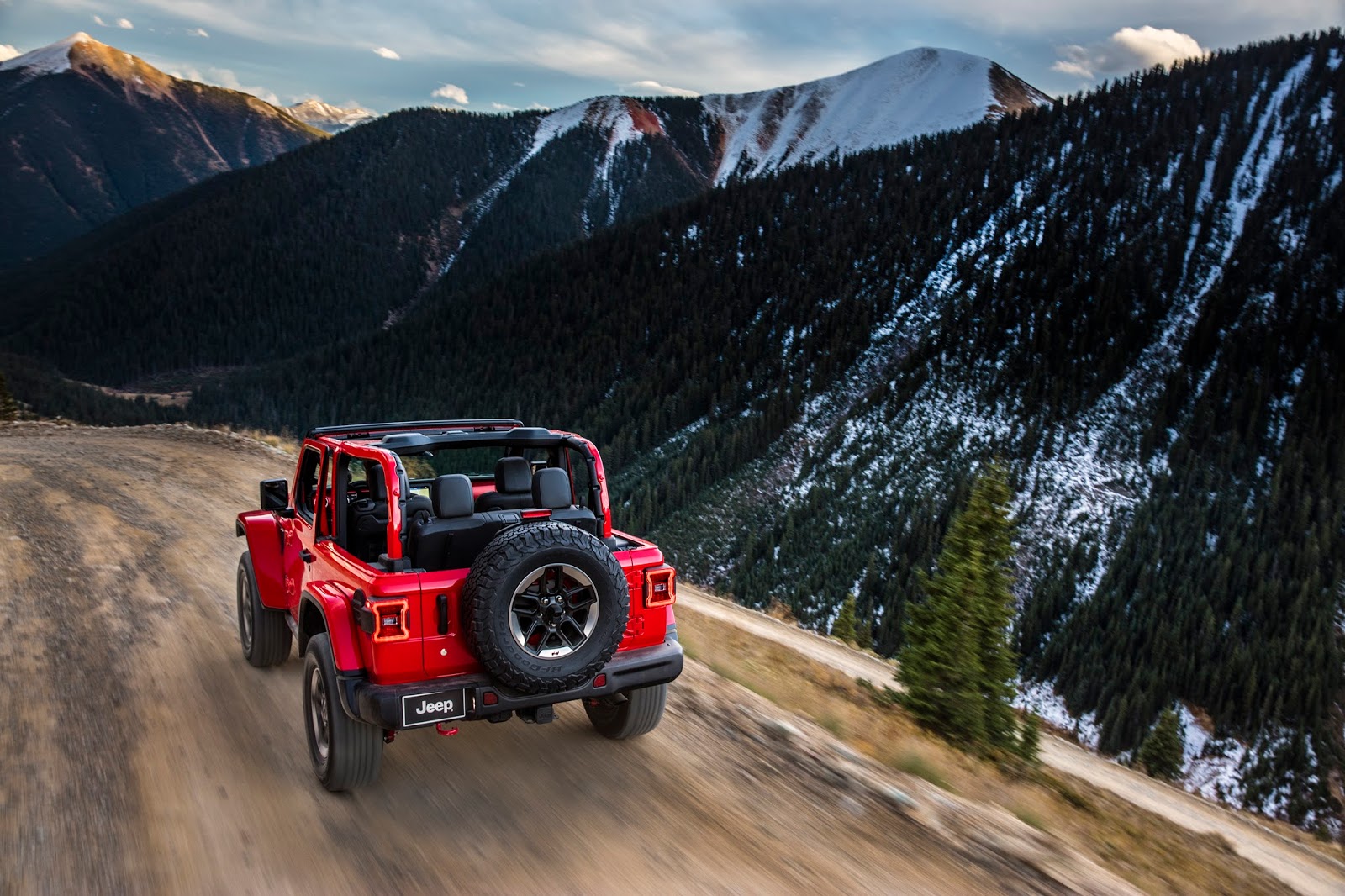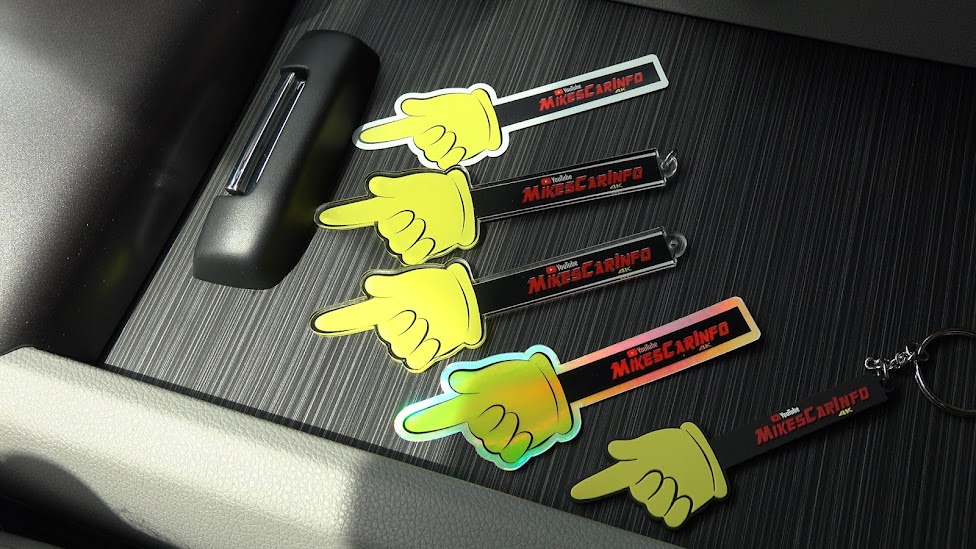All-new 2018 Jeep® Wrangler Delivers Legendary Off-road Capability With Improved On-road Driving Dynamics
- Unmatched capability with body-on-frame 4x4 architecture for even more off-road capability and improved on-road performance
- Wrangler’s fully boxed frame has been optimized to reduce weight while providing increased strength in critical areas
- Lightweight, high-strength aluminum doors, hinges, hood, fenders and magnesium swing gate help reduce weight and boost fuel economy
- All Wrangler models now feature electro-hydraulic power steering as standard equipment for improved steering feel and fuel economy
- An advanced five-link suspension system delivers unmatched capability and improved road manners
- Solid front and rear axles, locking differentials and a disconnecting front sway bar continue to make Wrangler the most capable production vehicle ever
- Industry-leading approach angle (44 degrees), breakover angle (27.8 degrees), departure angle (37 degrees) and ground clearance (10.9 inches)
- Standard electronic stability control, trailer-sway control, electronic roll mitigation, brake traction control and Hill-start Assist
- Wrangler features optimal ride and sound characteristics for a quieter cabin
Los Angeles Nov 29, 2017 - The all-new 2018 Jeep® Wrangler receives a multitude of enhancements versus its predecessor to optimize the ride, handling and sound characteristics while reducing weight and improving fuel economy. Utilizing a body-on-frame design and featuring a five-link suspension system, Wrangler delivers even more capability, with improved on-road driving dynamics, ride comfort and passenger safety.
“The all-new 2018 Jeep Wrangler is an authentic Jeep SUV that further improves on its legendary off-road capability,” said John Mrozowski, Vehicle Line Executive – FCA US LLC. “Additionally, the new Wrangler adds improved on-road driving dynamics and comfort in all weather conditions.”
“The all-new 2018 Jeep Wrangler is an authentic Jeep SUV that further improves on its legendary off-road capability,” said John Mrozowski, Vehicle Line Executive – FCA US LLC. “Additionally, the new Wrangler adds improved on-road driving dynamics and comfort in all weather conditions.”
Proven body-on-frame design is the foundation for legendary Jeep capability
The new 2018 Jeep Wrangler’s body-on-frame design is bolstered by eight body mounts on two-door models and 10 on the four-door. A fully boxed frame utilizes high-strength steel in all critical areas and hydroformed sections of the front rails set a strong foundation to better handle the front suspension load. Galvanized frame components are utilized for improved corrosion protection. In total, five boxed cross members are used on Wrangler.
To protect critical components while on the trail, including the fuel tank, transfer case and automatic transmission oil pan, Wrangler employs four skid plates and bars. Rubicon models benefit from the use of heavy gauge tubular steel rock rails to curtail potential body damage inflicted while out on the trail.
New for 2018, a header bar now connects the A-pillars and stays in place even when the windshield is folded down. This allows the rearview mirror to remain in place with the windshield folded.
The use of lightweight, high-strength aluminum closures, including the doors, door hinges, hood, fender flares and magnesium swing gate help reduce weight and boost fuel economy.
Other ways the Jeep engineering team looked to reduce weight included using hollow track and stabilizer bars, aluminum engine mounts and steering gear, and a larger, lighter master cylinder.
For 2018, Wrangler continues to utilize the proven five-link coil suspension configuration. Wrangler’s front suspension features a lateral control arm and four longitudinal control arms. Full width track bars made of forged steel control lateral movement of the axle with minimal angle change during suspension travel. The roll center height has been raised and the spring rates retuned to provide a comfortable ride when traveling around town.
The five-link rear suspension features two upper and two lower forged steel control arms for longitudinal control and a track bar for lateral axle control. The fuel tank is positioned in a central location and the control arms are located outside of the frame rails. The rear shocks are splayed (angled inboard at the top) to provide consistent damping.
The shocks have been retuned and demonstrate optimum balance between on-road handling and legendary off-road capability. Ride comfort, body roll control and handling is significantly improved with new shock tuning, hard points and body mount strategy.
On Wrangler Rubicon models, an electronic front sway bar disconnect is featured to provide additional wheel travel when the terrain calls for it.
An industry-leading approach angle of 44 degrees, breakover angle of 27.8 degrees, departure angle of 37 degrees and a ground clearance of 10.9 inches allows Wrangler to go anywhere.
Wrangler also benefits from up to 30 inches of water fording and up to 3,500 pounds of towing capacity with the available towing package.
Electro-hydraulic power steering
All Wrangler models now feature electro-hydraulic power steering to deliver a more natural steering feel and improved fuel economy. The steering system’s pump draws power from an electric motor that activates when it senses driver input and applies a variable amount of torque to assist the driver while steering. The electric motor works with an adaptive engine control unit (ECU) to monitor steering speed, steering wheel angle and vehicle speed. This allows for variable amounts of steering assistance to be applied, for example, when more is needed at low speeds maneuvering through a parking lot, or less when at highway speeds to enhance vehicle stability.
Wrangler’s steering knuckles face outward into the wheel envelopes and reduce scrub radius. This allows for improved steering stability while braking and enhances steering input, including bump steer when going over uneven surfaces.
The roll center height has been raised on Wrangler and overall turning radius improved. Curb-to-curb turning circle is a snug 34.5 feet on Wrangler and 40.8 feet on Wrangler four-door models.
Both Wrangler two-door and four-door models feature electro-hydraulic power steering as standard equipment with a steering ratio of 17.4:1 for two-door models and 15.6:1 for the four-door. Wrangler’s steering wheel can go from lock-to-lock in 3.5 turns for two-door models and 3.2 turns for four-door models.
Braking system and electronic stability control
The all-new 2018 Wrangler features larger brakes to improve stopping power when compared to the outgoing model. Stopping distance, brake noise, pedal feel and rotor life have all been improved as a result. A larger, lighter master cylinder, new full-time electric vacuum pump and redesigned pedals are also utilized to optimize braking performance.
Wrangler Sport models now feature 12.9 inch x .94 inch vented rotors while Sahara and Rubicon models use 12.9 inch x 1.1 inch vented rotors. Wrangler Sport features 1.9-inch twin piston, floating calipers up front and 1.8-inch single piston, floating calipers in back. Wrangler Sahara and Rubicon models feature two-inch twin piston, floating calipers in front and 1.9-inch single piston, floating calipers in the rear. The total swept front brake area on all Wrangler models is 75 square inches.
In back, Wrangler Sport models feature 12.9 inch x .47-inch rotors with cast iron, floating calipers while Sahara and Rubicon models use 13.4 inch x .55 inch rotors with cast iron, floating calipers. Total swept area for the rear brakes is 62 square inches on Sport and Sahara models and 66.8 square inches on Rubicon. All Wrangler models features a parking brake with a drum-in-hat design.
As part of Jeep’s commitment to safety, four-wheel disc brakes and electronic stability control (ESC) are standard. The ESC system works with the anti-lock brake system (ABS) and includes sensors on all four wheels that are all monitored for wheel slip, particularly when deteriorating conditions in snow, ice, mud and wet pavement arise. If the system detects wheel slip, the brakes are applied to assist in keeping Wrangler on its desired path.
The ABS and ESC systems have been optimized for both on- and off-road conditions and demonstrated by the ESC system’s ability to operate in three different modes – “full on,” “full off” and “partial on.”
Other systems that work under ESC include electronic roll mitigation, which uses sensors positioned at the center of the vehicle to detect yaw and apply the brakes when needed, and trailer-sway control, which reduces trailer sway and bolsters vehicle handling when demanding conditions, such as crosswinds, are detected. Brake traction control monitors and reduces wheel spin during hard acceleration from a stop or at low speeds in low traction situations by applying the brake to the wheel(s) that is slipping.
Quiet interior environment
Jeep engineers optimized the 2018 Wrangler’s structural design through the powertrain mounting system to isolate powertrain, wind and road noise. Both the 3.6-liter Pentastar V-6 and all-new 2.0-liter inline four-cylinder engine’s noise are hardly noticeable while idling. On the 3.6-liter V-6, all necessary accessories are mounted right to the engine without the use of excess brackets. This allows all accessories, including the air conditioner compressor and alternator, to be anchored firmly, and are impermeable to vibration and noise. This clever design allows the 2018 Jeep Wrangler to boast improved interior sound quality.
Nearly 4 million miles of testing
The all-new Wrangler has undergone more than 3.9 million miles of testing – one of the highest totals ever for any FCA US vehicle. Extreme-weather testing occurred in various environments, including the scorching Arizona heat and blistering cold of Alaska, for weeks at a time. Wrangler was also subjected to global test miles in areas such as China, Brazil, India, Australasia and Italy. In addition to all laboratory and standardized tests, the all-new Wrangler traversed Northern Michigan mud and the Rubicon Trail.




Comments
Post a Comment